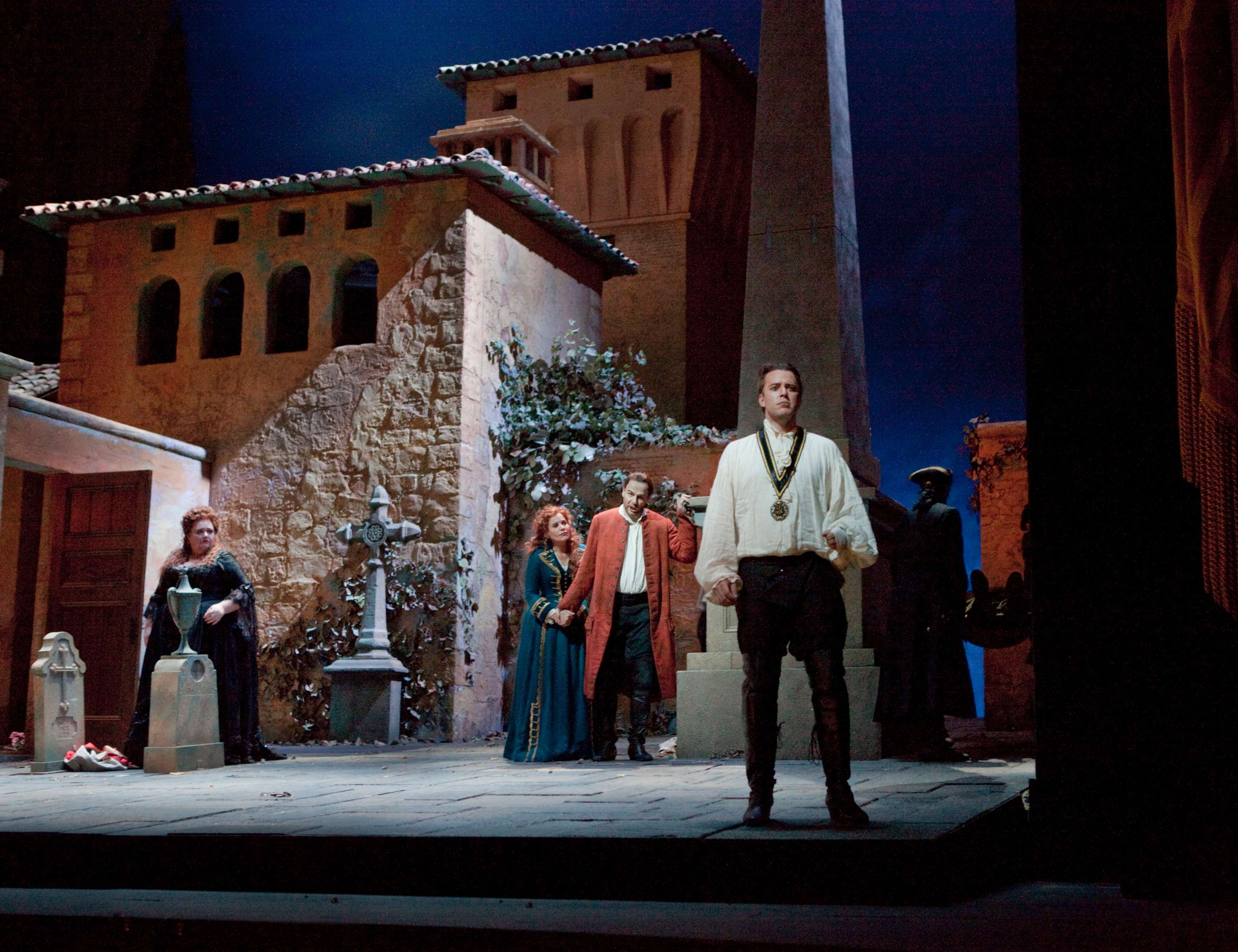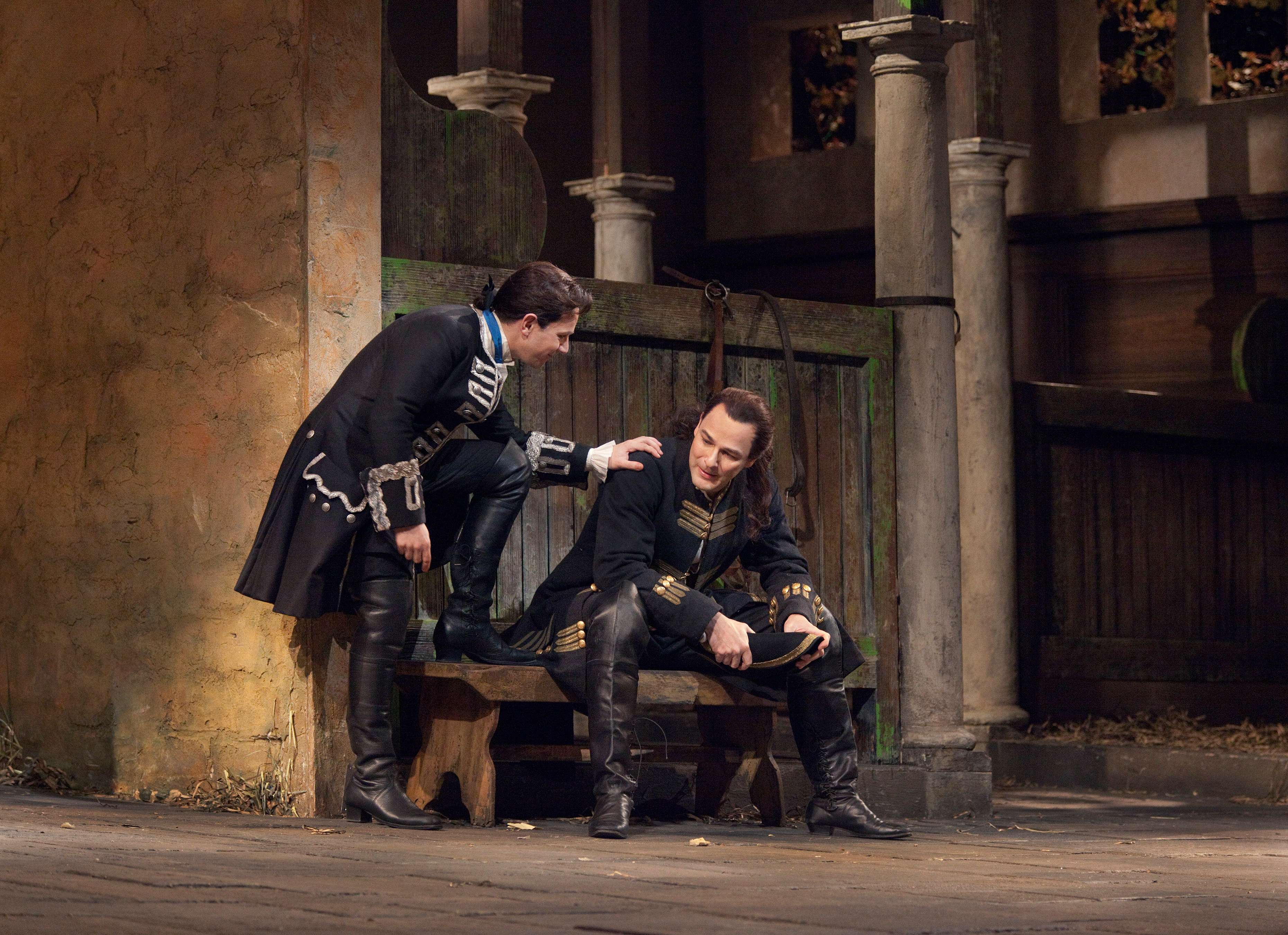|
Back
Handel At His Most Enchanting New York
The Metropolitan Opera
11/14/2011 - and November 19, 23*, 26, 30 and December 3, 7, 10, 2011
Georg Frideric Handel: Rodelinda
Renée Fleming (Rodelinda), Stephanie Blythe Eduige), Andreas Scholl (Bertarido), Iestyn Davies (Unulfo), Joseph Kaiser (Grimoaldo), Shenyang (Garibaldo)
Metropolitan Opera Orchestra, Harry Bicket (Conductor)
Stephen Wadsworth (Production), Thomas Lynch (Set Designer), Mratin Pakledinaz Costume Designer), Peter Kaczorowski (Lighting Designer)

(© Ken Howard/The Metropolitan Opera)
The Met, in large part because of its huge size, has never really embraced the baroque repertoire. Its 2004 production of Rodelinda was only the fourth Handel opera to be staged there. Two years later, the production was revived. This month it returned to the Met once again in triumph, with several members of the original cast (Renée Fleming, Stephanie Blythe and the conductor Harry Bicket), another from the 2006 revival (countertenor Andreas Scholl), and Iestyn Davies, a marvelous British countertenor making a stunning Met debut.
Rodelinda is one of the most sublime works in the operatic canon. Handel graced the opera with seemingly inexhaustible melodic invention manifested in a virtually endless succession of beautifully crafted arias (29 actually) crowned by a duet and quintet. Rodelinda alone has eight. In a musical tapestry of da capo arias giving voice to the most complex and convoluted of plots, fostering dramatic flow and engagement would seem a difficult challenge indeed. But director Stephen Wadsworth, updating the setting to 18th century Italy, drew from the singers compelling individual characterizations as well as excellent dramatic ensemble work.
The beautiful tradition sets designed by Thomas Lynch ranged from a magnificent library literally crammed with books to a courtyard filled with lovely architectural detail and cypress trees. The set changes were in the nature of a frieze, as the new set rolled onto the stage from the right and the old one exited on the left. The costumes by Martin Pakledinaz were just right and the lighting by Peter Kaczorowski was simply stunning, particularly when the golden stone of the garden was bathed in the warm glow of the Italian sun.

I. Davies and A. Scholl (© Ken Howard/The Metropolitan Opera)
This performance provided my first opportunity to hear live the extraordinary voice of Andreas Scholl. His “Dove sei, amato bene?”, sung with a plaintive, almost otherworldly beauty, was especially fine. Scholl is a fabulous musician, deploying his superb instrument with dynamic nuance, subtle vocal coloration and impeccable legato. His eloquent phrasing heightened the poignancy to an almost unbearable degree. He received a huge ovation from the Met audience.
In his Met debut, Iestyn Davies sang three challenging arias and was superb in all of them. But the highlight was surely the coloratura tour de force, “Sono i colpi della sorte.” He sang with a beautiful bright round tone and a full-bodied voice that was more muscular perhaps than Scholl’s graceful instrument. Davies sang very much in character, with grace and refinement; his technical mastery made the runs and ornamentation seem effortless. And he made “Un zeffiro” into a jewel of rare beauty.
Renée Fleming is, of course, the reason for the production and subsequent revivals of Rodelinda. She still has a rich and often lovely quality to her voice but her top is not what it was. She was also clearly underpowered at both ends of her range. Although Bicket was at all times sensitive to the needs of his singers, Fleming was drowned out on occasion and the others were not. Her performance was always emotionally compelling and her duet with Scholl at the end of act 2 was beautifully realized -- a vocal highpoint of an evening filled with stunning music.
As Eduige, Stephanie Blythe sang with her customary opulent tone, unforced power, and dramatic commitment. Joseph Kaiser as Grimoaldo was that rarity – a tenor villain. He sang with an ardent tone as he wooed Eduige, but also made an implacable and imposing enemy for Rodelinda and her husband. Shenyang’s large dark voice sounded splendid and he was a most convincing and repellent villain.
The Metropolitan Opera orchestra under Maestro Bicket provided an animated and beautifully detailed reading of Handel’s luxuriantly melodic score. Their vibrato was clearly scaled back and of a piece with the period. On December 3rd, Rodelinda will be broadcast worldwide in HD. And on December 15th, Iestyn Davies will make his New York recital debut at Carnegie Hall.
Arlene Judith Klotzko
|